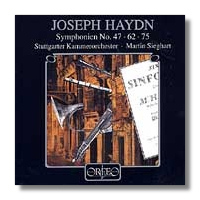
The Internet's Premier Classical Music Source
Related Links
- F.J. Haydn Reviews
- Latest Reviews
- More Reviews
-
By Composer
-
Collections
DVD & Blu-ray
Books
Concert Reviews
Articles/Interviews
Software
Audio
Search Amazon
Recommended Links
Site News
 CD Review
CD Review
Franz Joseph Haydn

- Symphony in G Major, Hob I:47 (1772)
- Symphony in C Major, Hob I:62 (1779)
- Symphony in D Major, Hob I:75 (1780)
Stuttgart Chamber Orchestra/Martin Sieghart
Orfeo C253931A 69min
Where did Mozart get his musical ideas? At least a few of them came directly from his dear friend Haydn, as the three symphonies on this disc conclusively demonstrate. From them Mozart extracted materials which he later reworked and refined in such diverse compositions as the 19th Piano Concerto, the 3rd of his "Haydn" Quartets, Prague Symphony, and Don Giovanni. To cite just one example, II of Symphony 47 is a charming set of variations on a theme that later turns up in Mozart's familiar and beloved Serenade for 13 Winds. On the other hand, the inventive development section of I of Symphony 62 - with its mysteriously tense atmosphere and sudden, unexpected fortissimo outbursts - looks ahead to Haydn's irascible student, Beethoven. So does this Symphony's minuet, which could easily be mistaken for one of the younger man's Country Dances.
The more I listen to this disc, the more I appreciate both the splendor of Haydn's writing (is there actually such a thing as a bad Haydn Symphony?) and Mr. Sieghart's stylish and thoroughly ingratiating interpretations. The Stuttgart Chamber Orchestra fortunately employs modern instruments. A larger string ensemble would have supplied more weight and dramatic power, but I suppose this is the best we can expect in our authenticity-crazed era. One can only imagine what a Thomas Beecham, Karl Böhm, or Leonard Bernstein might have accomplished with these wonderful scores and a full symphony orchestra.
Sieghart is considerably more thoughtful and entertaining than Doráti (from his recording of the complete Haydn symphonies on London). Where Doráti's Philharmonia Hungarica all too often appears to be sight-reading, the Stuttgart players have been painstakingly prepared. And while Doráti often rushes through the music at a frenetic pace without regard to its structure or content, Sieghart takes his time, fully exploring the glorious heart and soul of each work. His interpretations are elegant and stately without ever becoming pompous or dull. In addition to the customary repeat of the exposition in the opening movements of Symphonies 47 and 75, Sieghart also repeats the entire development and recapitulation. Haydn's writing is so splendid that I hardly mind hearing it again and again and again…
Orfeo's warm and atmospheric sonics represent a tremendous improvement over the hissy and tinny analog recordings that London gave Doráti. According to the latest Schwann/Opus, only Symphony 47 is otherwise available on a single disc (with the Monadnock Festival's period instrument ensemble on Albany or the Hungarian Chamber Orchestra on White Label).
It's easy to see why Mozart was so enchanted by these scores. You will be, too. Warmly recommended.
Copyright © 1995, Thomas Godell



















